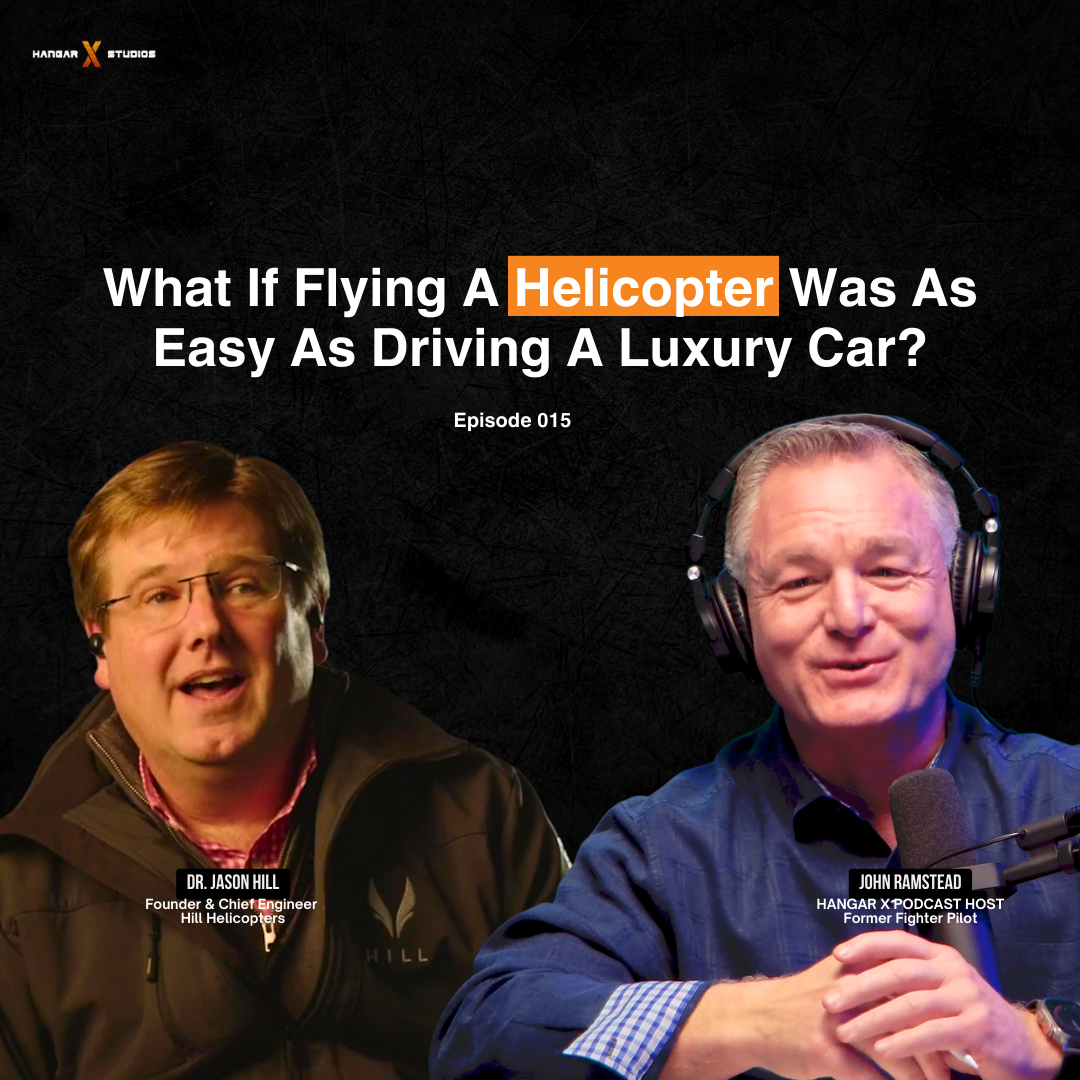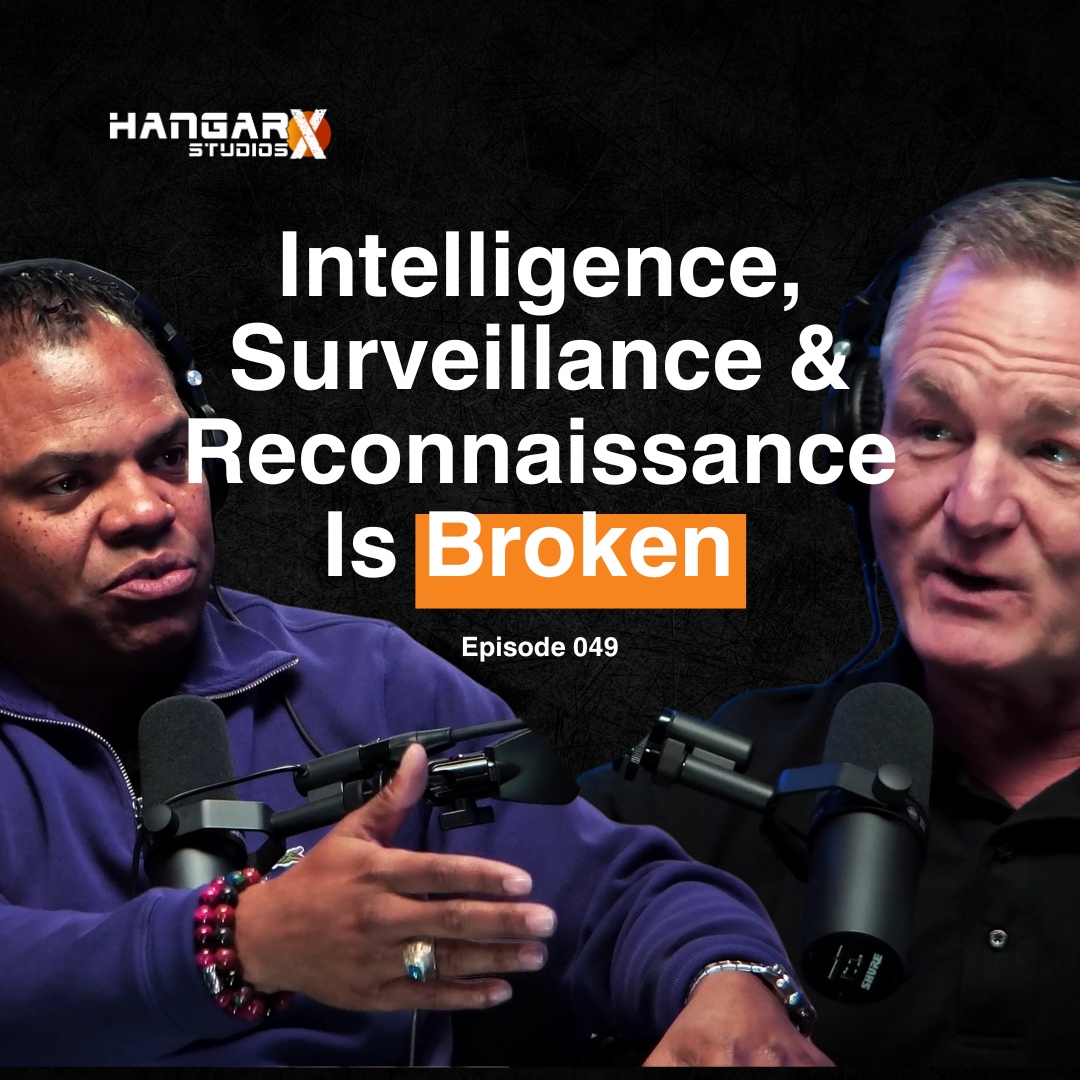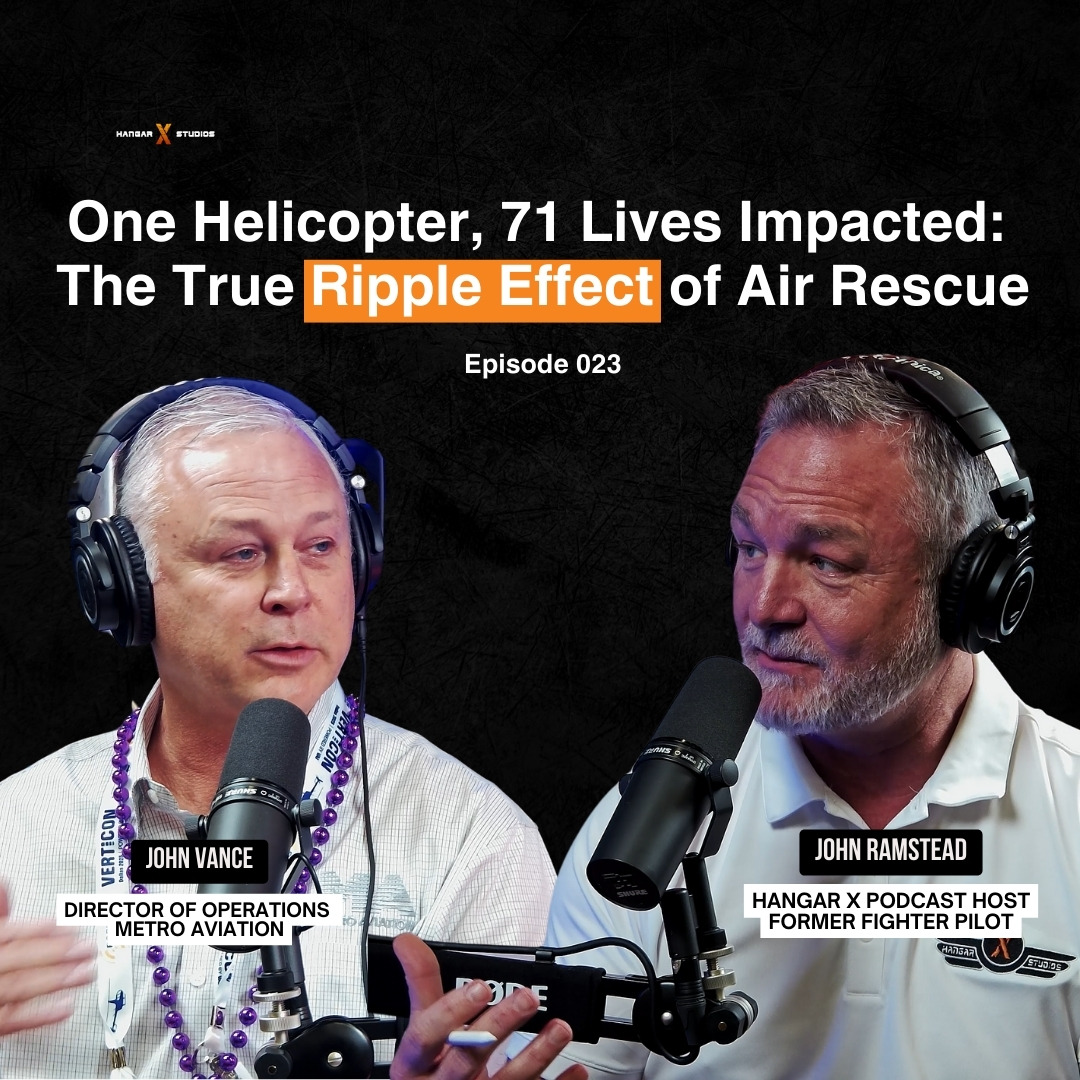Episode Transcript
[00:00:03] Mike Martin: Hey, everyone here has got that same goal, that same perspective. Let's help save more lives. Let's make search and rescue organizations safer. Let's make these rescues safer. That way, we ultimately save more lives in the process.
[00:00:17] Intro: Welcome to Hangar X Studios, where former fighter pilot and host John Ramstead takes us on a journey across aerospace as it enters an historic period of innovation and transformation.
Our guests include aviation experts, pilots, financiers, military leaders, and innovators of all types.
Buckle up for another episode of Hangar X.
[00:00:47] John Ramstead: All right. Hey, welcome to the Hangar X podcast. We are here live at verticon, and we're having a great discussion today with Mike Martin. Mike, welcome to the podcast.
[00:00:57] Mike Martin: Thanks for having me.
[00:00:58] John Ramstead: So you're with Air Rescue Systems. And first of all, thank you for your service in the army as a crewman. And you spent a lot of time doing hoist and rescue missions and medevac, and then you joined Air Rescue. But I'd love to hear a little bit about that before we dive in.
[00:01:13] Mike Martin: Yeah. So traditionally, start off as a ground medic. Let me adjust that a little closer. There we go. Yeah. Start off as a ground medicine, quickly transitioned to flight medic, and from there, mostly medevac, but also extreme interest in hoist. Hoist rescues. That's really kind of where that kind of passion stuff kicked off, and from there, kind of expanding those programs and looking at what other organizations are doing and kind of looping it all together.
[00:01:40] John Ramstead: Yeah. And how long did you spend active duty?
[00:01:44] Mike Martin: So I've actually been guard my whole time.
[00:01:46] John Ramstead: Oh, no kidding.
[00:01:47] Mike Martin: Utah National Guard.
[00:01:48] John Ramstead: Okay.
[00:01:49] Mike Martin: We've got. We don't really have that much rescues compared to some of the other states. Some other states have more aggressive customer base, I should call it.
[00:01:57] John Ramstead: Okay.
[00:01:58] Mike Martin: But yeah, quite a few rescues. A lot of coordination with the assets out there. A couple combat deployments that they throw in the mix. But yep, most of my. Most of my time, I start off reserves for like a year or two, and now I've been guard the rest of it.
[00:02:10] John Ramstead: Love it, Matt. Well, first of all, thanks for your service. And could you give us a little background, though, on air rescue systems and what you're. What the company's up to?
[00:02:17] Mike Martin: Yeah. So Air Rescue Systems has actually been around about 25 years. They started off just doing search and rescue in Oregon, and they've kind of transitioned from an actual rescue organization into a training organization and then.
[00:02:30] John Ramstead: But they actually doing the rescue missions. They had the helicopters. They were. They were contracting to go out and.
[00:02:35] Mike Martin: Contracting out doing search and rescue in The Oregon area. And it's kind of evolved into a training platform. And that's where Vita came in. Vita came in and wanted to join up is collaboration now.
[00:02:47] John Ramstead: What's Vita?
[00:02:47] Mike Martin: So Vita is the parent company for air rescue systems.
[00:02:50] John Ramstead: Okay.
[00:02:50] Mike Martin: They're, they're really well known for like their anti rotational spin device, the VRs, the Vita rescue system, and just kind of that same mindset of whether through technology, equipment, training, what makes people safer when they hoist.
[00:03:04] John Ramstead: Okay.
[00:03:04] Mike Martin: Yeah.
[00:03:05] John Ramstead: And now what's your role at ars?
[00:03:07] Mike Martin: So I'm the new vice president of training.
Aris. Most people, when they think of that historically Bob Cockle has been the one going out doing a lot of the training events. And with Bob retiring at the end of the year, I'm coming in with that transition. But also kind of expansion with ARS to really push more training perspective, more equipment. Also really look at the technology that drives it all and get it all on the same page.
[00:03:32] John Ramstead: Yeah. So like you said, ARS is expanding. There's an expansion happening on. So what's driving that expansion?
[00:03:39] Mike Martin: Well, traditionally the ARS was mostly just Bob and his team going out and training and with more organizations looking at hoist platforms or really just air rescue in general, being able to provide that outside perspective for training options. And we'll give them different thought perspectives from the outside in looking at safer, more efficient air rescue operations and take what they like and move to continue to collaborate in the future.
[00:04:07] John Ramstead: Yeah. What are some of the training methods that you're bringing into this expansion?
[00:04:11] Mike Martin: So with the expansion, it's a lot more perspective. We're looking at branching out. It's not just Mike with his army experience. We're looking at people with different backgrounds, different thought processes for how to make these rescues safer and more efficient and then getting everyone together on the same page to collaborate. So that way, when we start looking at newer ideas, newer thought processes, that way we have more of a. It's not just one person's experience that's driving the training.
[00:04:40] John Ramstead: Yeah. And what is your expectation on how that affects the preparedness of the helicopter rescue crews?
[00:04:46] Mike Martin: So a lot of preparedness. And we were talking a lot about this earlier with the safety conferences that the phrase that gets said so often is you don't know what you don't know.
[00:04:56] John Ramstead: Yeah.
[00:04:56] Mike Martin: It's trying to get that outside thought perspective and it's really hard to do that in the moment. Especially on a rescue. You have a lot going on. There's the adrenaline. So it's really trying to be able to force that, enforce that safe perspectives, thought process, experiences from other people, stuff that didn't work and may have unfortunately had led to some type of mishap or incident. Being able to learn from that in the future to avoid those types of incidents and actually progress the industry in a safer manner.
[00:05:23] John Ramstead: Well, I gotta tell you, so I was flying over the Sea of Japan and I got behind my wingman and he went to do a maneuver to get away from a gunshot.
[00:05:33] Mike Martin: Okay.
[00:05:34] John Ramstead: And got into a flat spin and had to eject over a storm. We were fighting way up high.
[00:05:38] Mike Martin: Okay.
[00:05:39] John Ramstead: And he ejected in the clouds. So we went down through the clouds and we broke out at 200ft. And after a 45 minute search and rescue grid, we finally found them in the water and we called the helicopters over. It was a 20 foot sea state.
So could you imagine being in? You know, and so we had a diver in the water. I remember they were coming in to pick him up and all of a sudden they had to abort because a big giant wave came at the helicopter. They had abort. They finally got him out.
But the dynamics when you're in a rescue situation, I can't even imagine some of the things you've seen with, you know, mountains, winds, storms, high, hot.
[00:06:12] Mike Martin: I mean, everyone has its own unique challenge. And it's interesting too, because when you think of like that perspective, like just those crews and all their different like, thought processes and stuff like that, that's a great foundational knowledge that you could add to a more collective idea, especially when you're training. Because then most people are not thinking of those types of risks. They're not really. That's not something that they can involve their program and develop their program into a safer operation with those different perspectives.
[00:06:42] John Ramstead: Yeah. So it's a way of thinking, but it's also great tools and processes. Now, you mentioned Vita before and I don't know a lot about it. So the Vita rescue system, and I know you guys have Pelican, right? Could you share a little bit about what those are for people that don't aren't familiar with it.
[00:06:54] Mike Martin: So Vita, it's a fairly newer company. The CEO, he was actually on a search and rescue operation that unfortunately, due to the high winds and the environment around them, they had to abort the actual helicopter rescue. And that kind of incentivized his thought process.
[00:07:11] John Ramstead: He's like, you know what? If we had something different, I might not have had to abort. Somebody could have been saved.
[00:07:16] Mike Martin: Yeah. And so that's really where the Vita rescue system was kind of developed was that thought process of like hey, there's gotta be technology out there to stop that spin risk that that crew was specifically worried about when they had abort that rescue floor. So it with Vita and ars, the nice thing is really everyone at the company, their thought process and their, their drive, it's just to help save more lives. Which has been a refreshing change for me actually joining danting with the ARS is like hey, everyone here has got that same goal, that same perspective. Let's help save more lives, let's make search and rescue organizations safer, let's make these rescues safer. That way we ultimately save more lives in the process.
[00:08:00] John Ramstead: So you guys provide training for aircraft departments, you have equipment?
[00:08:04] Mike Martin: Yeah, we've got different rescue equipment, we have training and a lot of that's like more based off of what we've gotten from the field. Yeah, especially like my experience we got talk to other people in the field like hey, what equipment do you want? What do you want to see? What are you having issues with? So our equipment is very operator dependent on what we actually decide we want to push out versus stuff that we, we don't consider that to be top tier operator, hoist equipment or utility short line equipment, stuff like that.
[00:08:35] John Ramstead: It's yeah, well I was not hoisted out but 13 years ago I had an accident that was so severe I was life flighted out by helicopter. And if they hadn't shown up, I don't think I'd be here. I'd probably be a quadriplegic. So I have so much respect for the work you guys do.
Mike, thank you so much. And just as we wrap up, what's this kind of final thought? What are you excited about here in the year ahead?
[00:08:54] Mike Martin: Honestly, I'm excited to get out and train with more people. The more perspectives you get, the more you can start thinking about things that other people have been maybe talking about for years, but not actually addressing. It's always those weird little issues that hey, is there a better way to do this? That's our, that's our mentality is that always assume no matter what we're doing, what we're training, teaching our equipment, always assume there's a better way to do it. And we strive to find what that.
[00:09:21] John Ramstead: Is to improve us and then share.
[00:09:23] Mike Martin: And then share it and then hopefully we'll find and tweak things or if we've kind of figured out hey this is looking perfect for what that operators need. No, let's go continue to strive. We're always going to assume there's a better way. And always try to improve on that.
[00:09:38] John Ramstead: Love that. Great way to end up, man. Oh, thanks. I know you're a little sore there. That's right, Mike. Great to have you. Keep knocking alive. And I look forward to a next conversation. Maybe up in Broomfield one day when you're there.
[00:09:51] Mike Martin: Yeah, definitely. Sounds good.
[00:09:52] John Ramstead: Okay. Have a great one.
[00:09:53] Mike Martin: Thanks.


